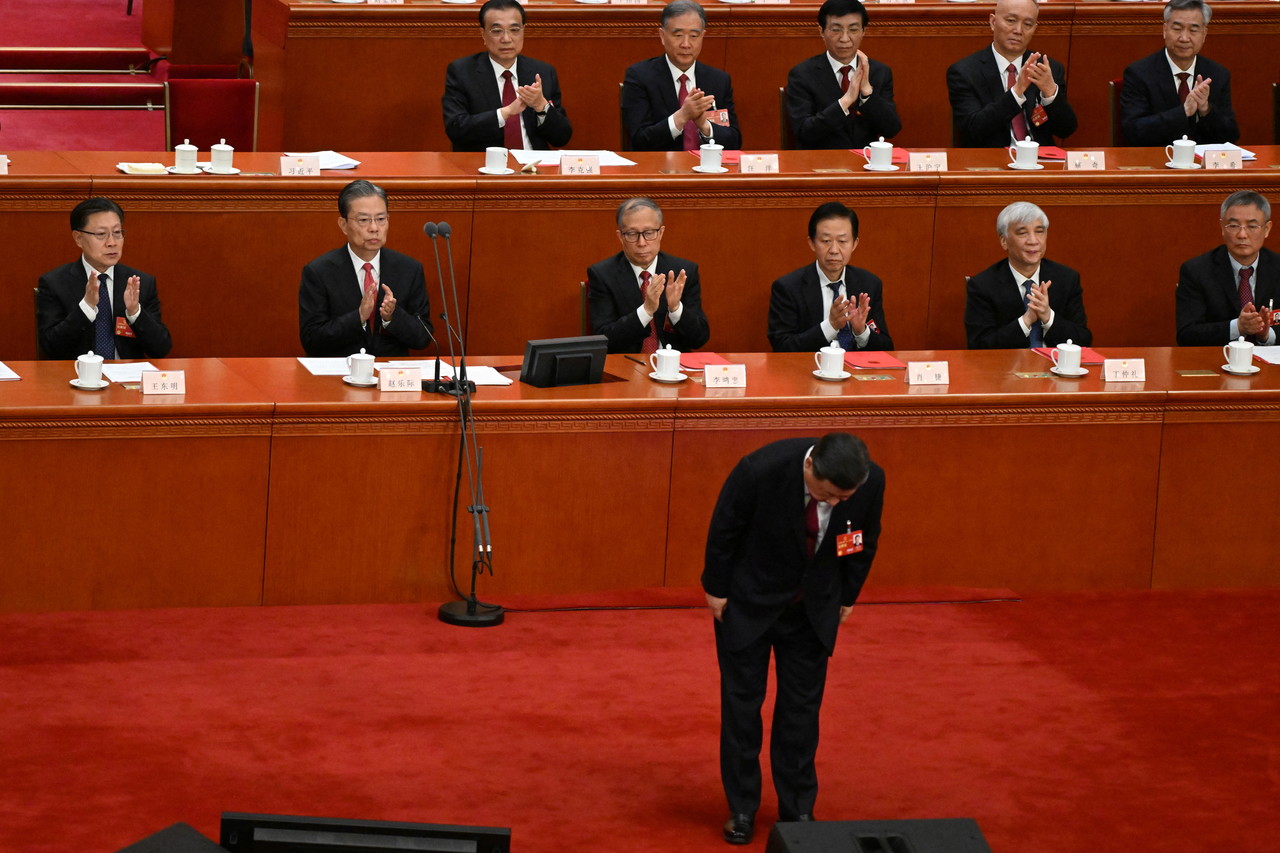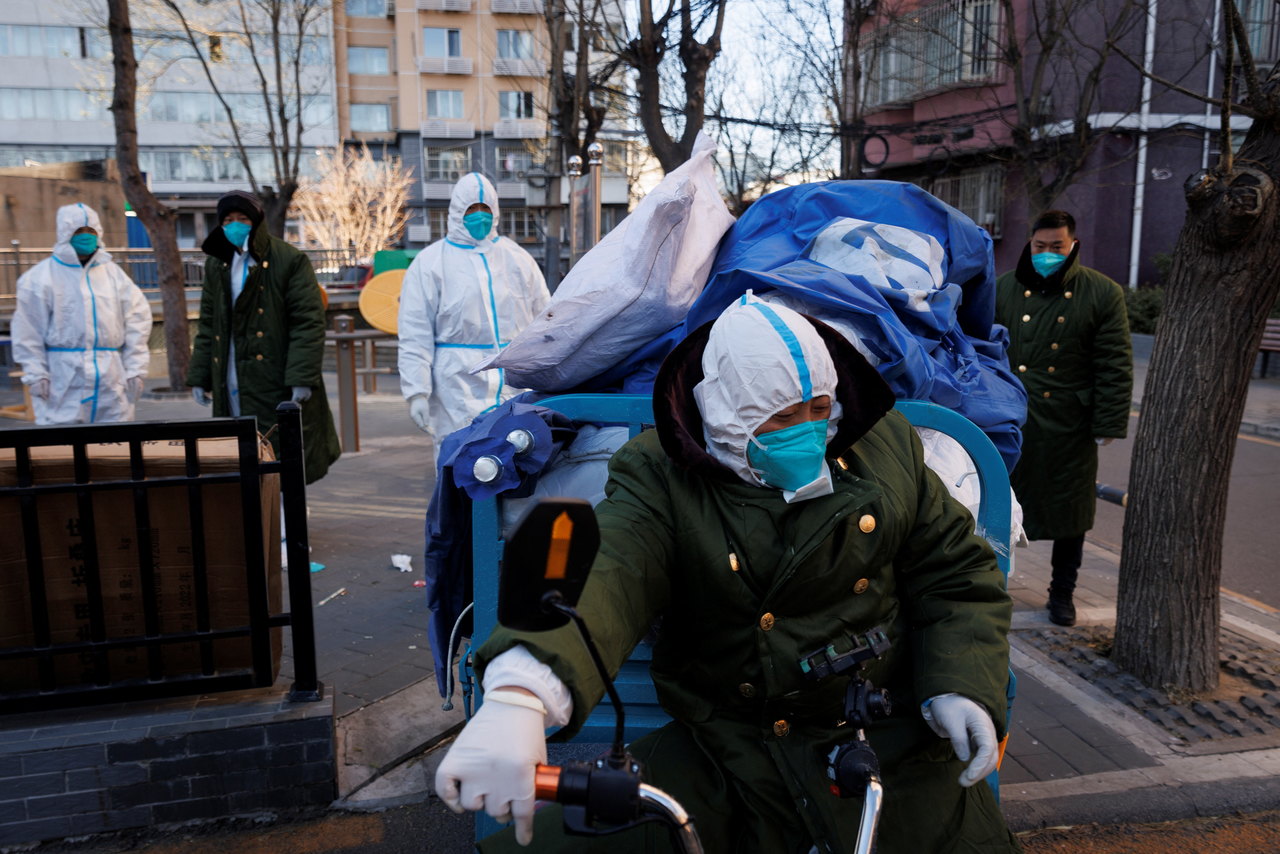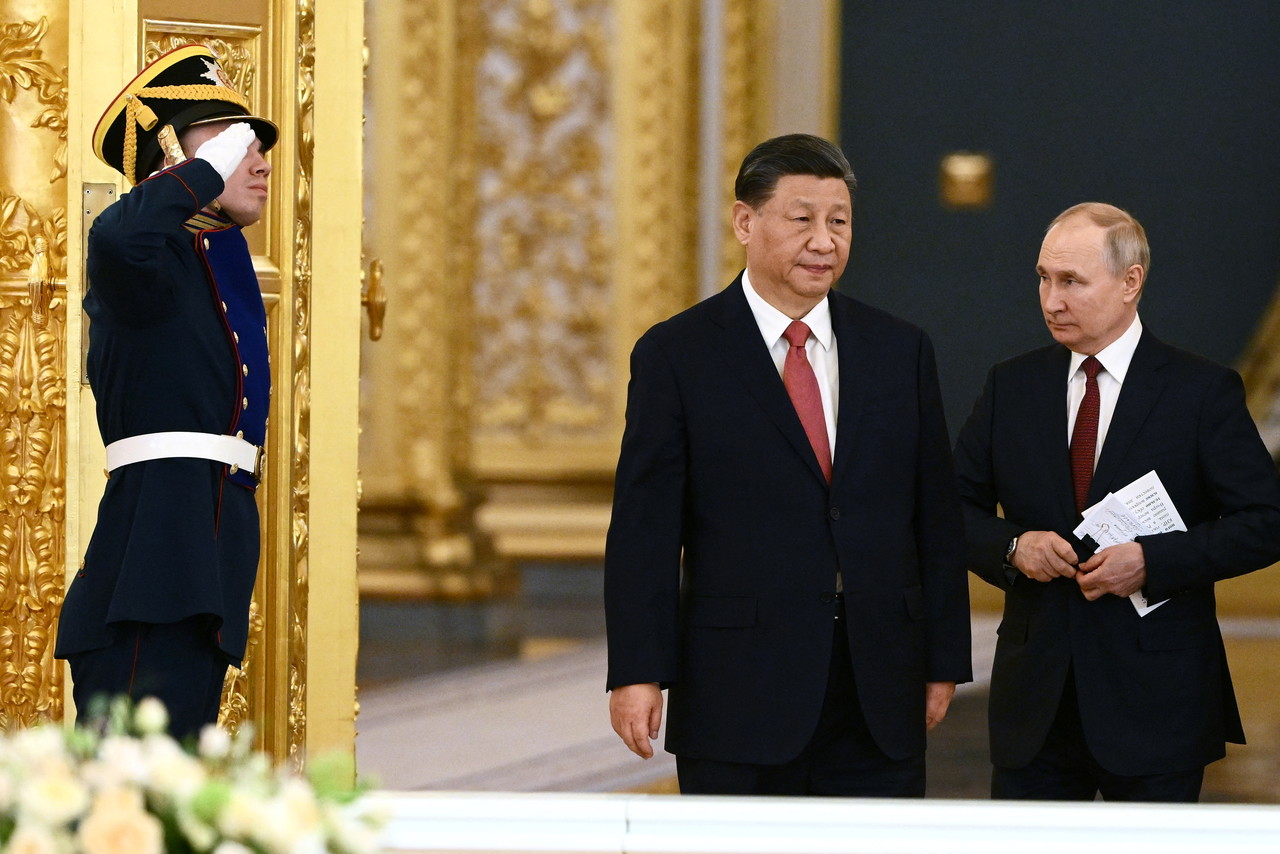Chinese Parliament Meets: Xi Gets Third Term, Structural Changes Confirmed
During the session of China’s National People’s Congress (NPC), which ended on March 13, Xi Jinping was elected for a third term as chairman. The delegates approved the new composition and structure of the government, and Li Qiang, the former head of the Chinese Communist Party (CPC) in Shanghai, became prime minister. The Chinese authorities are planning to increase the rate of economic growth to about 5% this year and counteract the increase in unemployment among young people. The speeches by Chinese leaders during the session indicate a deepening of the rivalry with the U.S. as well as the strategic dimension of cooperation with Russia.
 POOL / Reuters / Forum
POOL / Reuters / Forum
The NPC is the Chinese parliament, the annual session of which serves, among other things, to adopt new laws previously approved by the CPC. During the session, China’s prime minister reports on the government’s work and presents plans for the current year. This year’s NPC was the first after the end of the five-year term of office of the Chinese authorities, which involved the need to hold elections for China’s chairman, vice chairman, prime minister, and members of the government. The nominations and programme postulates adopted during the NPC resulted from the decision of the 20th Congress of the CPC in October 2022 and were accepted by the Politburo. They were generated during the difficult situation in China after the abolition of the “zero COVID” policy and uncertain economic development forecasts. They were also related to China’s complicated international situation, including the introduction by the U.S. (in cooperation with Japan and the Netherlands) of restrictions in the modern technology sector.
Personnel and Economy
An important part of the NPC session was the elections for positions to the state apparatus. Xi Jinping was elected for the third time as the chairman of China, taking advantage of the abolition of the two-term limit by the NPC in 2018. The vice-chairman of the PRC (representative function) was Han Zheng, who until 2022 was a member of the Standing Committee (SC) of the CPC, the main decision-making body in the party. The new heads of the NPC and the Chinese People’s Political Consultative Conference (an advisory body with a lower political rank than the NPC) became, in accordance with the procedures for filling state positions, members of the CPC’s SC, Zhao Leiji and Wang Huning, respectively.
The new prime minister of China is Li Qiang, a member of the CPC’s SC and until autumn 2022 the head of the party in Shanghai. In the years 2004-2012, he was Xi’s close associate in the Zhejiang province. His good relations with Xi are intended to improve the implementation of the CPC’s directives and plans by the state apparatus. This was reflected in the rules of government operation published after the NPC session, from which references to the ideology of Xi’s predecessors were deleted, and the need for state authorities to consult “important decisions” with the Central Committee (CC) was emphasized. Li Qiang will be supported by new deputy prime ministers: Ding Xuexiang (oversees economic reform and relations with Hong Kong, member of the SC) and He Lifeng (responsible for economic relations with the U.S., member of the Politburo). The new Minister of National Defence and State Counsellor (a position higher than minister but lower than deputy prime minister) was General Li Shangfu from the strategic forces, also subjected to U.S. sanctions. Foreign Minister Qin Gang, the former ambassador of China to the U.S., also became a State Counsellor, and his significant position is evidenced by the fact that this happened right after he became a minister in December 2022 (his predecessor, Wang Yi, had been waiting for such a promotion for 5 years).
The new government is to focus on economic issues. Stimulating the private sector, developing modern technologies, and increasing consumption are the main goals indicated in the Chinese government’s report for 2023. The authorities assume that this year’s GDP growth will be around 5%, the unemployment rate in cities will be 5.5% (in February this year it was 5.6%, but among people aged 15-24, it was as high as18.1%), and the budget deficit will be at the level of 3%. To achieve this, the authorities increased social transfers and lowered corporate taxes. They also want to work to increase the involvement of private entrepreneurs in the economy, whose trust in the government has decreased in recent years as a result of their activities being more closely subordinated to the party (e.g., the creation of CPC cells in enterprises) or the detention of the heads of Chinese companies, for example, in technology. For this reason, more and more entrepreneurs, fearing the effects of the government’s policy, tried to move their capital outside China. Possible problems with the achievement of economic goals, even despite the lifting of restrictions resulting from the “zero-Covid” policy in December 2022, are evidenced, among others, by the relatively low retail sales ratio, which increased by 3.5% y/y in January-February compared to 8% in the same period in 2019.
Reform of Administration
During the session, the NPC adopted structural changes in the state and party apparatus intended to give an impulse to the development of the economy, increase independence from cooperation with foreign countries, and at the same time make the CPC’s supervision of the economy more effective. The National Data Bureau will be established within the government, which, in addition to the already existing Cyberspace Administration of China, is to improve data management, an important element of the development of the technology sector, especially artificial intelligence. A National Financial Regulatory Administration (NFRA) also will be established, taking over the competences of regulators of the banking and insurance sectors. The restructuring is to cover the Ministry of Science and Technology, for example, transferring to the NFRA the competence to evaluate and promote the most important projects. During the session, it was announced that 5% of central government officials will be fired and the rest would have their salaries cut as part of disciplining the staff. According to the authorities, this is to streamline decision-making processes. The changes in the state structure are accompanied by plans to create new organs in the CPC’s CC. The Central Commission for Finance (responsible for creating financial policy), the Central Financial Work Committee (ongoing supervision), and the Central Science and Technology Commission, responsible for the mobilisation of resources and supervision over the operation of state scientific offices, are to be established.
Foreign and Security Policy
The NPC session was also a forum for important declarations on Chinese foreign policy. Xi Jinping made an ideological interpretation of China’s actions in the international arena, pointing to the pursuit of stability and calling for the “courage to fight” in defence of China’s interests. One element of this is to be the further development of the potential of the armed forces. Therefore, in 2023, official spending on the army is to increase by 7.2% in nominal terms (to more than $220 billion).
Xi’s message reinforced the rhetoric of defending China’s interests, presented, for example, during the 20th Congress of the CPC. China will actively compete with the U.S., and by presenting itself as a counterbalance, the Chinese aim to convince the countries of the Global South (and to some extent also the EU) to cooperate with them. This cooperation is to be reflected in multilateral international events planned for this year in China—the China-Central Asia Summit and the 3rd Belt and Road Forum for International Cooperation. The “assertiveness” contained in Xi’s slogans was reflected in the statements of the head of the Ministry of Foreign Affairs regarding the continued pursuit of Taiwan, the alleged U.S. responsibility for destabilising the international situation, and the development of cooperation with Russia, which was reflected in the outcomes of the March visit of the Chinese chairman to Moscow. Concerning the war in Ukraine, the main themes from “China’s Position on a political settlement of the Ukrainian crisis” presented in March this year were repeated.
Conclusions and Perspectives
The election of Xi to a third term as chairman of China (unprecedented in the history of the PRC) confirms his strong position in the country’s domestic and foreign policy. It consolidates his power and extends the hierarchy of the decision-making process, which may result in a distorted view of reality at the top, among the state leadership, and thus slow its reaction to developments in China and abroad. The election results do not indicate a possible successor to Xi; vice-chairman Han Zheng cannot be considered because of his age, indicating Xi’s current term may not be his last.
The NPC’s decisions also demonstrate that the authorities are aware of problems in the Chinese modernisation process, as well as the threats related to U.S. technological restrictions and the condition of the financial and real estate sectors. From the CPC’s point of view, supervision over the modern technology sector is of key importance. Therefore, instead of supporting the scientific innovation and cooperation with business, the authorities are creating new state offices and commissions within the Central Committee and emphasising the need for business to obey the leadership of the party.
The rhetoric of Xi and the head of the Ministry of Foreign Affairs indicates that China will continue the confrontation with the U.S., including over cooperation with Russia and possible takeover of the island of Taiwan. The emphasis on Chinese modernisation solutions at the NPC session as a model for the countries of the Global South is intended to strengthen relations between them and China. At the same time, Chinese diplomacy will continue to try to persuade the EU to increase its autonomy from transatlantic cooperation, also with regard to U.S. policy towards China. The improvement of relations with the EU is also intended to help China maintain the impression of readiness to mediate in the war in Ukraine, although the credibility of these announcements is undermined by Chinese economic and political support for Russia, which is also unfavourable from the perspective of the security interests of Central Europe and Poland.



_sm.jpg)

